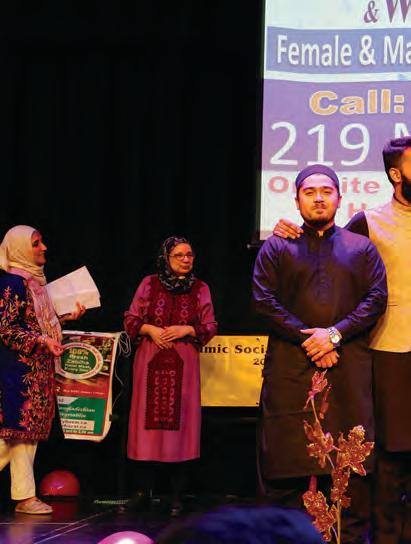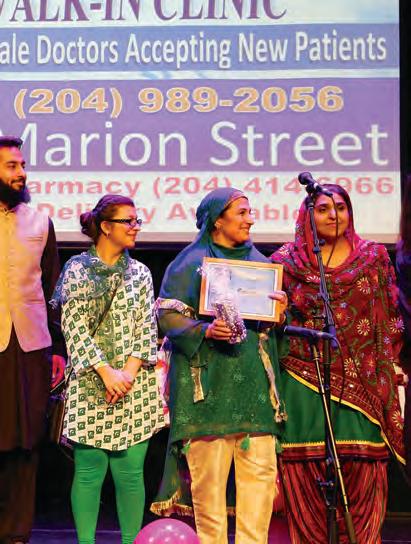
7 minute read
An Overview of Social Services
An Overview of Social Services for Muslim Canadians Traditional attitudes are very hard to change
BY SHAHINA SIDDIQUI
Advertisement
Muslim Canadians are projected to top 2 million by 2030 from their present 1.2 million. Considering this growth, they need to reexamine their priorities: What are and will be the needs of their families, youth and newcomers? Answering this question will enable us to establish sustainable, professional and integrated social services; provide mental health support independent of mosques; and to maintain the users’ confidentiality and dignity. Mosques can refer people to these services, as well as promote counseling and advising Muslims to use these services when necessary.
Of course, these service providers will have to work within Canada’s legal framework and the paradigm of integrated Canadian and Islamic core values, and be equipped with multicultural literacy, to best serve their diverse clientele.
During the 1950s and 1960s, the influx of Muslim immigrants necessitated the organization and establishment of mosques and community centers. In the following decades the building of mosques and Islamic schools was prioritized. The common myths were that Muslims did not have social or family issues like the general Canadian population, and that when they did, imams and family friends could deal with “social issues” regardless of their training and expertise.
A SNAPSHOT OF MUSLIM-TO-MUSLIM SOCIAL SERVICES
■ In 1990, the nonprofit Islamic Social Services and Resources Association (ISSRA; https://www.issra.ca) developed out of the Metro Toronto and area Muslims’ practical needs. During the 1980s, the Jami Mosque evolved from a small local house of worship into an all-purpose Islamic center serving thousands. Imam Abdullah Hakim Quick, along with a core of dedicated Muslim professionals, offered to help serve vulnerable individuals and families. ■ The Islamic Family Social Services Association (IFSSA; https://www.ifssa.ca), incorporated in 1992 in Edmonton, Alberta, by a small visionary and dedicated group, is the first Muslim social services organization not affiliated with any mosque or established Muslim organization. Its steady expansion into various offices that serve the city’s geographically diverse Muslims and the steady support it receives from the Alberta government for newcomers’ settlement services represents a success model for Muslim social services. ■ In 1993, Major (retd.) Abbas and Sarwar Jahan Begum (“Uncle” and “Aunty”) established a small Halal Food Bank in Scarborough, Ontario. Under the banner of Toronto’s Muslim Welfare Canada (MWC; https://www.muslimwelfarecentre.com), its motto was “Service to humanity is service to Allah.” Its existence was made possible through a loan from a good friend and well-wisher. The staff devoted their time, money and energy to developing this charity so that it could benefit the needy far into the future. This food bank, located in a 10×10 foot room, provided groceries and other essential household items to anyone in need, irrespective of religion, nationality or ethnicity.
Within just a few years, its supporters’ generosity and volunteers enabled the center to enhance its services. It embraced a new goal — providing a safe haven for needy women and their children — to meet a critical need. With their tireless efforts and zeal, the duo realized this goal in 1996 and named this facility, located in Whitby, Ont., the Muslim Welfare Home for Needy Women and Children.
Other pioneering services were gradually
introduced, among them international programs (e.g., supporting a child, free clinics, water exploration and disaster relief) in 2000, local programs (e.g., halal meals on wheels and halal food banks in Montreal and Mississauga) in 2005 and a free medical clinic for Scarborough’s uninsured residents in 2009.
The planning and effective operation of these services kept the revered couple busy until the very end. Aged 87, Major Muhammad Abbas Ali breathed his last on April 17, 2009, after a brief illness while in Pakistan to monitor MWC’s international projects. In honor of his exemplary service to humanity, the City of Toronto renamed a Scarborough park as Major Abbas Ali Park. Appropriately, it is located very close to MWC’s head office — the same place where they began the charity in 1993. ■ The Muslim Family Network Society (MFNS; https://www.muslimfamilynetwork. org), established in Calgary in 2003, joins other Muslim community organization in holding clothes and food distribution drives that serve thousands each year. It also provides counseling and mediation services for individuals and families in crisis. Founder Idrees Khan has been recognized for her devotion to volunteerism and community services. ■ The nonprofit Muslim Resource Center for Social Support and Integration (http:// mrcssi.com), founded in 2009 in London, Ont., helps families and individuals overcome the realities that impact their family safety.

Shahina Siddiqui (second left) conducts an
ISSA-Canada event The first North American Islamic Social Services Association (ISSA) was established in 1999 at a meeting of Muslim social workers, mental health professionals and community workers in Washington, D.C. Its visionary American founders were the late Dr. Maryam Funches, Dr. Aneesah Nadir and Dr. Bilqis Eltarab, and the Canadian Shahina Siddiqui.
In 2003 ISSA Canada (http://issacanada. com) and ISSA USA (https://issausa.org) split into independent sister organizations. That same year, ISSA-Canada received charitable status.
During its first few years, ISSA hosted five North American conferences on Muslim social, mental health and family issues. The response was overwhelming and very positive. These conferences provide a forum for Muslim social workers, mental health professionals and researchers to highlight issues, share research, define advocacy as social service providers and discuss solutions and strategies to address the critical challenges facing North America’s Muslims.
ISSA-USA’s focus remains empowering families, strengthening marriages, improving mental health and training service providers. ISSA-Canada, in addition to providing traditional social services, focuses on post9/11 realities and the demonization of Islam. These new concerns propelled it to engage with the media and human rights advocacy by prioritizing the publication of guides for all civil society sectors to address Islamophobia through education and information sharing. It offers professional and targeted training in cultural and spiritual literacy to law enforcement, schools, media, health care and other sectors. Having received international recognition for their content and vision, some of them have been reproduced in the U.S., Australia and Europe.
Since many Muslims may choose to consult imams who aren’t necessarily trained
STRADDLING TWO COUNTRIES
as counselors or social workers, ISSACanada trains imams on how to understand and help Muslims resolve their issues within the Canadian context and informed by Islamic paradigm while encouraging them to make referrals to appropriate professionals. The course emphasizes Muslim spiritual counseling as regards domestic violence and sexual abuse.
While ISSA-Canada is headquartered in Winnipeg, Manitoba, its services and expertise are sought nationwide both at home and abroad. Its successful approach helps Muslims deal with issues in a spiritually and culturally safe delivery model. It is currently formulating a national strategy to prevent Islamophobia through capacity and skill building.
ISSA-Canada seeks to make Canada’s public service sectors competent and free of anti-Muslim bias by providing educational training. To that end, it initiated the formation of the Federation of Canadian Muslim Social Services to coordinate and facilitate the exchange of expertise, research, skills and information among various regional and national Muslim service agencies both to avoid duplication and to develop a strong platform for advocacy on social issues on the community’s behalf.
Other new initiatives have filled some gaps, among them Naseeha (https://naseeha. org), a hotline for Toronto youth, and NISA Homes (https://www.nisahomes.com), which serves women seeking shelter.
A major development in social service for Muslims in Canada has been the establishment of Deen Support Services (http://www.deensupportservices.ca), a registered Canadian charity founded by Muslims with disabilities, which operates several programs and services through the Muneeba Center in Mississauga and serves people with disabilities regardless of religion, language and culture.
A POSITIVE DEVELOPMENT
This growth in social services indicates that social issues are being taken seriously. And yet funding these nonprofit organizations remains a non-priority for the community. Even today, Muslim Canadians are more willing to donate for building mosques and Islamic schools, rather than to services that strengthen families, provide counseling services and help people in crisis. Our collective proverbial “head in the sand of denial” still prevails.
With 30 years of experience in this field, I can state without a doubt that today’s Muslims are facing the same social and family issues as other Canadians. The divorce rate among North American Muslims is almost equal to that of the rest of society. Suicide, depression, anxiety, domestic abuse, at-risk youth, anti-social behavior, family conflict, as well as addiction to drugs, alcohol and pornography, are all on the rise. Untreated mental health issues, war trauma, sexual abuse, at-risk youth and intergenerational stressors are increasing at an alarming rate. We have reached a critical stage to reassess our priorities and start investing in the area of social service, mental health and family empowerment.
If Muslims Canadians ignore these new realities and problems, they will be responsible for causing irreparable damage to their social and family structures. Coordinating and supporting Muslim-toMuslim social services, delivered by qualified professionals, can no longer be ignored. ih
Shahina Siddiqui, LLD, co-founder and volunteer executive director of ISSA-Canada, is a freelance writer, spiritual counselor, human rights and anti-racism activist, public speaker and chair of Islamic History Month Canada.








